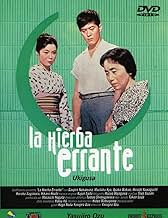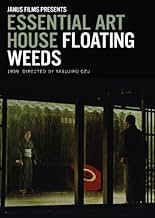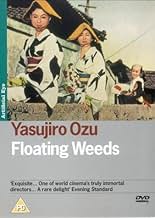CALIFICACIÓN DE IMDb
7.9/10
9.5 k
TU CALIFICACIÓN
El lider de una troupe teatral japonesa regresa a la localidad costera en la que dejó a su hijo, que cree que él es su tio, para intentar recuperar el tiempo perdido, lo cual da celos a su a... Leer todoEl lider de una troupe teatral japonesa regresa a la localidad costera en la que dejó a su hijo, que cree que él es su tio, para intentar recuperar el tiempo perdido, lo cual da celos a su actual amante.El lider de una troupe teatral japonesa regresa a la localidad costera en la que dejó a su hijo, que cree que él es su tio, para intentar recuperar el tiempo perdido, lo cual da celos a su actual amante.
- Dirección
- Guionistas
- Elenco
- Dirección
- Guionistas
- Todo el elenco y el equipo
- Producción, taquilla y más en IMDbPro
Opiniones destacadas
This, one of Ozu's last films, has all the elements of a Shakespearean tragedy played out among people living simple, workaday lives: deceit, jealousy, betrayal, vengeance, love, hope. It's all there. The acting by an all-star cast (at the time) of Japanese actors, including the gorgeous Ayako Wakao, is uniformly excellent. The cinematography may be the best I've seen for any color film made in the 1950's. The overall pace was a bit too slow for my liking, but it works well with a static camera taking every shot below eye level. This gives the viewer a visual perspective similar to looking at the actors on a slightly elevated stage, just as the audience does when watching the plays put on by the itinerant group of actors that centers the film. Overall, a well-crafted work by a recognized master, but not for the 'explosions & car chase' crowd. Rating: 8/10
Ozu is a wonderful experience just to watch the musical formations. Each shot is composed in the most careful way so that the assembly has a geometric rhythm. It is soft and melodic, this visual overlay, painting in motion. No one does it better that I know.
There's a talk between two troubled lovers in the rain, then in opposing shelters, that is especially noteworthy, but it is all so cinematically lovely...
The way he's put this together is very Japanese. Each shot length is nearly precisely the length of the one before. Each employs a stationary camera only, but the positioning of the camera only sometimes is where a human eye would be. As I've mentioned, The composition in terms of elements, space and color is perfect in each shot and follows in a deliberate, engineered pattern from the previous shots.
The narrative isn't integrated in the way Kurosawa would do — and be considered un-Japanese for. But the story does much of that for us.
It is a story about pretense and staging, with most of the actors playing characters who are actors and have trouble in being an actor.
You'll have to work to be engaged in the story. But its rather easy to just sit back and admire the loveliness. Ozu is always worth it for this. I don't know many of his films, but this is the most formal of those I know.
Ted's Evaluation -- 3 of 3: Worth watching.
There's a talk between two troubled lovers in the rain, then in opposing shelters, that is especially noteworthy, but it is all so cinematically lovely...
The way he's put this together is very Japanese. Each shot length is nearly precisely the length of the one before. Each employs a stationary camera only, but the positioning of the camera only sometimes is where a human eye would be. As I've mentioned, The composition in terms of elements, space and color is perfect in each shot and follows in a deliberate, engineered pattern from the previous shots.
The narrative isn't integrated in the way Kurosawa would do — and be considered un-Japanese for. But the story does much of that for us.
It is a story about pretense and staging, with most of the actors playing characters who are actors and have trouble in being an actor.
You'll have to work to be engaged in the story. But its rather easy to just sit back and admire the loveliness. Ozu is always worth it for this. I don't know many of his films, but this is the most formal of those I know.
Ted's Evaluation -- 3 of 3: Worth watching.
Komajuro Arashi and his acting troupe arrive in a small fishing village on the coast of Japan. Komanjuro goes to visit a woman who runs a sake bar, and who, we learn, is a former lover, and with whom he fathered a child, though the child is unaware of this fact and believes him to be his uncle
Their son, Kiyoshi, has just finished high school, and Komanju comes to see him as much as his former lover. He hopes that Kiyoshi will be able to become something in his life and not end up like Komanju himself, a washed-up actor drawing small crowds for his failing samurai productions.
When Komajuro talks with his gorgeous young son, we can see the excitement in his eyes, in his face. The acting here is all rather flat, or better, it's reserved. (Ozu adds a little joke to this later in the film, when on a fishing boat Kiyoshi accuses his father of being "too muggy" in his performance.) This adds to the impact of the few emotional (and physical) outbursts later in the film.
The conflict in the film is that of Komajuro's double lives. When his current mistress, Miss Sumiko -- a jealous and conniving witch of a woman -- discovers that he's been seeing some other woman, she's enraged, and plots what she believes will be his sort of downfall. By hiring a young woman, Kayo, to seduce Kiyoshi and embarrass Komajuro, she plans on making the two seem like different generations of the same person, both relating with unimportant actresses, thereby ruining Komajuro's hopes of his son becoming somebody important.
Unlike most, Ozu is an auteur because of what he doesn't do. His unmoving camera, which is famous, sits placidly, observing the characters with interest. I do sometimes wish that the camera would move around curiously, interested in the conversations of the characters, but maybe Ozu's point was that his camera is (or we should be) too interested to move, and that the events of everyday life need not be jazzed up for entertainment purposes. (He seems to mock this idea when he has Komajuro say to Kiyoshi about his plays that, basically, modern audiences can't appreciate good drama.) The entire film is restrained; on the rare occasion when people cry, they cover their faces and softly whimper.
The ending shot of a dark blue sky, with red lights from a rolling train, reminds us that whether it's 2003 in North America or 1959 in a small Japanese fishing village, we're all the same people with the same problems.
In and of itself, the film is terrifically simple: a simple story, with simple acting, simple music, and made even more simple by the simplicity of the static camera. But what makes the film something special, rather than just some family drama, is the honesty. Ozu isn't after anything big here. Any enlightenment comes from Ozu's realization that the most important conflicts are in the home, the ones no one sees, the ones we all feel.
****
Their son, Kiyoshi, has just finished high school, and Komanju comes to see him as much as his former lover. He hopes that Kiyoshi will be able to become something in his life and not end up like Komanju himself, a washed-up actor drawing small crowds for his failing samurai productions.
When Komajuro talks with his gorgeous young son, we can see the excitement in his eyes, in his face. The acting here is all rather flat, or better, it's reserved. (Ozu adds a little joke to this later in the film, when on a fishing boat Kiyoshi accuses his father of being "too muggy" in his performance.) This adds to the impact of the few emotional (and physical) outbursts later in the film.
The conflict in the film is that of Komajuro's double lives. When his current mistress, Miss Sumiko -- a jealous and conniving witch of a woman -- discovers that he's been seeing some other woman, she's enraged, and plots what she believes will be his sort of downfall. By hiring a young woman, Kayo, to seduce Kiyoshi and embarrass Komajuro, she plans on making the two seem like different generations of the same person, both relating with unimportant actresses, thereby ruining Komajuro's hopes of his son becoming somebody important.
Unlike most, Ozu is an auteur because of what he doesn't do. His unmoving camera, which is famous, sits placidly, observing the characters with interest. I do sometimes wish that the camera would move around curiously, interested in the conversations of the characters, but maybe Ozu's point was that his camera is (or we should be) too interested to move, and that the events of everyday life need not be jazzed up for entertainment purposes. (He seems to mock this idea when he has Komajuro say to Kiyoshi about his plays that, basically, modern audiences can't appreciate good drama.) The entire film is restrained; on the rare occasion when people cry, they cover their faces and softly whimper.
The ending shot of a dark blue sky, with red lights from a rolling train, reminds us that whether it's 2003 in North America or 1959 in a small Japanese fishing village, we're all the same people with the same problems.
In and of itself, the film is terrifically simple: a simple story, with simple acting, simple music, and made even more simple by the simplicity of the static camera. But what makes the film something special, rather than just some family drama, is the honesty. Ozu isn't after anything big here. Any enlightenment comes from Ozu's realization that the most important conflicts are in the home, the ones no one sees, the ones we all feel.
****
I wrote this after I saw my first Ozu's film, "Tokyo Story" about a year ago: "As with every great work, the film has its own unique perfection in style, rhythm, details, and artist's vision - but Tokyo Story is very universal in its appeal, simply put, it is for every parent, every son or daughter - for everyone. It was made 50 years ago in Japan, about people who lived far away, but it is also about all of us, our families, our problems, our guilt and our search for love and meaning. Ozu's film does not require one to be a movie buff or to try to solve complex symbolism to appreciate and love it. It brings smiles because it is a comedy (for at least the first 2/3) and sadness with a high drama of the last 1/3 of the film."
I feel absolutely the same about "Floating Weeds". The film is quiet and deceptively simple but its simplicity reminded me the words of Michelangelo Buanorotti. When asked how he created the perfect statues from the shapeless marble lumps, he answered, "It is very simple, you just cut off all unnecessary pieces".
Ozu's films are perfect - they touch us with rare warmth, soft enveloping tenderness and power of human emotions not necessarily with striking visual or sound effects. "Floating Weeds" is a remake of earlier silent black and white Ozu's film "The Story of Floating Weeds". The story is simple: an aging, traveling actor who is the manager of a kabuki troupe returns to a remote village where he secretly meets his former lover and her 19 year old illegitimate son, to whom he is known as "uncle." The older man finds happiness in communicating with his son who turned to be a fine young man. His current mistress, filled with jealousy because of his attachment to his secret family, hires a young beautiful girl, the member of a troupe to seduce a boy. Something in this story attracted Ozu so much that he remade the film twenty five years later.
"Floating Weeds" is a beautiful color film and it is the first color Ozu's film for me. The colors are bright and fresh, tender and kind - they match the director's style perfectly. The delightful music by Kojun Saito reminds me of Nina Rota music in Fellini's films - nostalgic, innocent and rhythmic.
I feel absolutely the same about "Floating Weeds". The film is quiet and deceptively simple but its simplicity reminded me the words of Michelangelo Buanorotti. When asked how he created the perfect statues from the shapeless marble lumps, he answered, "It is very simple, you just cut off all unnecessary pieces".
Ozu's films are perfect - they touch us with rare warmth, soft enveloping tenderness and power of human emotions not necessarily with striking visual or sound effects. "Floating Weeds" is a remake of earlier silent black and white Ozu's film "The Story of Floating Weeds". The story is simple: an aging, traveling actor who is the manager of a kabuki troupe returns to a remote village where he secretly meets his former lover and her 19 year old illegitimate son, to whom he is known as "uncle." The older man finds happiness in communicating with his son who turned to be a fine young man. His current mistress, filled with jealousy because of his attachment to his secret family, hires a young beautiful girl, the member of a troupe to seduce a boy. Something in this story attracted Ozu so much that he remade the film twenty five years later.
"Floating Weeds" is a beautiful color film and it is the first color Ozu's film for me. The colors are bright and fresh, tender and kind - they match the director's style perfectly. The delightful music by Kojun Saito reminds me of Nina Rota music in Fellini's films - nostalgic, innocent and rhythmic.
... aren't we all, their lives steadily unravelling as their audience shrinks, their relationships stretched with secrets, revenge and deception coming to the fore. A poetic observation of life that turns the seemingly ordinary into something quite the opposite and, as relevant today as it has always been, as it encourages you to reflect on who you really are or have been, where you've come from and, more importantly, where you might be going.
¿Sabías que…?
- TriviaStated by cinematographer Kazuo Miyagawa about director Yasujirô Ozu: "I'll never forget that, from the first day on, he knew the names of everybody on the set, fifty people in the crew, people he'd never worked with. He'd written their names down, I learned later. But everyone was impressed and became devoted to him. Every single day working on this film was extremely pleasurable and enriching. In each of Ozu's films you can sniff his personality. He was pure, gentle, light-hearted, a fine individual."
- ErroresNear the end, sandals disappear or move around: after Kiyoshi argues with his father, he runs upstairs, first slipping out of his sandals and leaving them at the bottom (center) of the stairs. Moments later, Kayo goes up to him. We see that she, too, removes her sandals at the bottom of the stairs. But Kiyoshi's sandals have now suddenly disappeared: we see only Kayo's sandals at the bottom of the stairs. Moments later, Kiyoshi comes back downstairs to go after his father. He goes to put on his sandals, which have now suddenly reappeared, but in a different location from where he took them off. A moment later, Kayo also comes down the stairs and puts on her sandals, which are approximately where she had removed them and placed them, moments earlier.
- Citas
Komajuro Arashi: You can't help an empty house, when it's empty.
- ConexionesFeatured in Siskel & Ebert Holiday Gift Guide (1989)
- Bandas sonorasWasurecha iyayo (aka: Don't forget me)
Composed by Yoshikatsu Hoshoda
Sang by the play troupe on a ship
Selecciones populares
Inicia sesión para calificar y agrega a la lista de videos para obtener recomendaciones personalizadas
- How long is Floating Weeds?Con tecnología de Alexa
Detalles
- Tiempo de ejecución1 hora 59 minutos
- Relación de aspecto
- 1.37 : 1
Contribuir a esta página
Sugiere una edición o agrega el contenido que falta

Principales brechas de datos
What is the German language plot outline for La hierba errante (1959)?
Responda

































